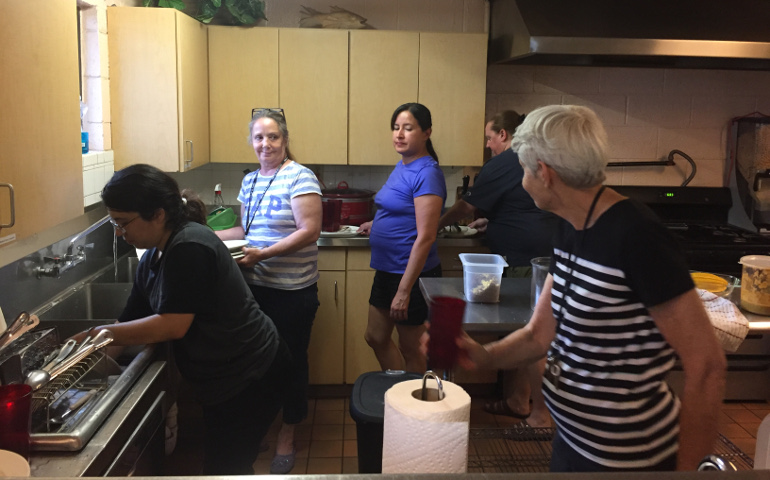
At Villa Maria, women take turns cooking dinner for everyone, and each do their own dishes. (GSR photo / Soli Salgado)
Loretto Sr. Mary Margaret Murphy was walking from the dining hall back to her office in August when she ran into a smiling young woman wearing scrubs.
The young woman had come back to the women's transition home to say hi to Murphy and tell her that, shortly after leaving the shelter Villa Maria in El Paso, Texas, she started a program to become a medical assistant.
"That's wonderful!" Murphy repeated between their hugging and hand-holding.
Back in her office, Murphy — the case manager at Villa Maria — said those encounters are what keep her motivated in a job that sees so many tragic backstories and struggles.
"You don't really know if they're going to make it when they leave, and then they come back like that," she told Global Sisters Report. "She's so young, and she has her whole future ahead of her, and just to see what she's doing is amazing."
That young woman was 18 when she arrived at Villa Maria, a transition home for women without children who are either homeless, fleeing abusive relationships, or fresh out of prison or jail. Some are refugees from Africa or Central America or just over the border in Juárez, Mexico.
In this case, the young woman hoped to leave a violent home when her high school counselor called Murphy to ask if they could take her in.
When at capacity, 22 women fill the 22 private rooms, their stay usually lasting about a year or less. Women must be at least 18 years old and cannot be forced to live at Villa Maria; the move must be by choice.
They come with nothing, referred through halfway houses, rehab centers, parishes or other organizations. They leave with savings, a job, and a slew of resources Murphy and her team provide as they help pave their path to recovery.
Whether it's a root canal or glasses, primary medical care or help with job applications — "anything they need, we work to try to get it," Murphy said.




